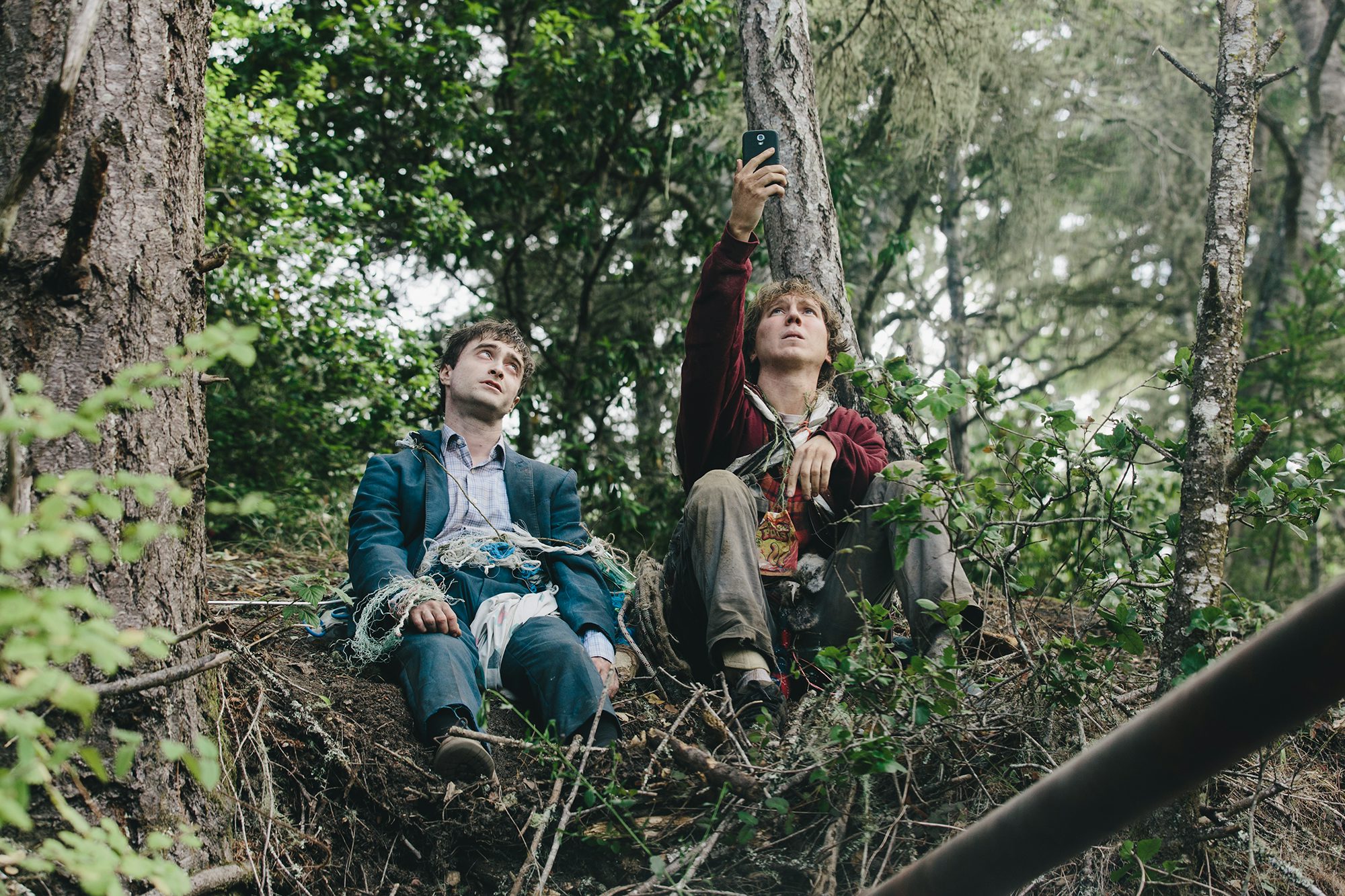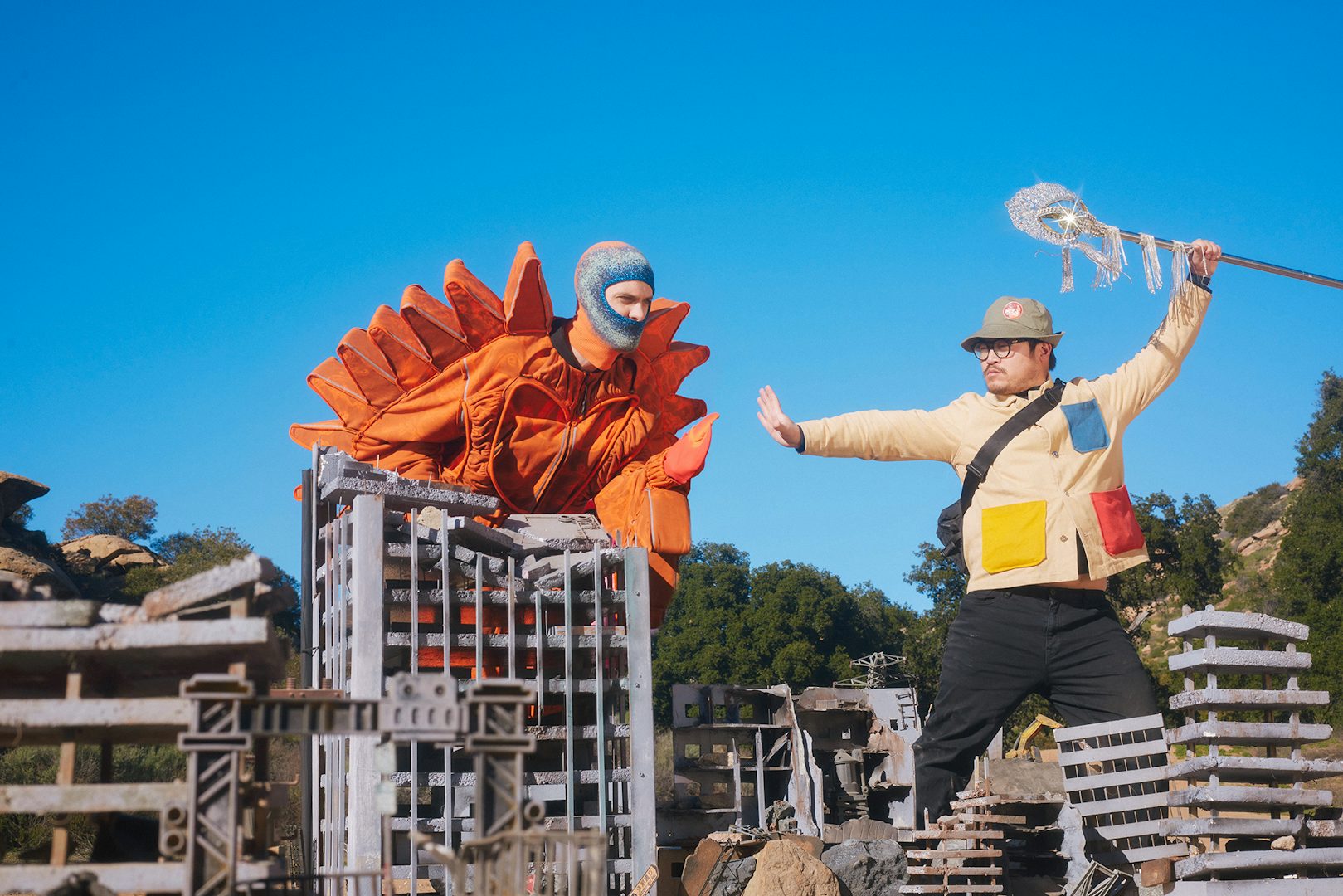If there’s one thing you can count on the Daniels for, it’s a willingness to get their hands dirty. The director duo – comprising Daniel Scheinert and Daniel Kwan – have directed, edited, created special effects and, where necessary, acted, danced, and even stunt-doubled in their productions. It’s an all-encompassing approach that feeds into their unique brand of surrealism, typically combining evocative storytelling with lo-fi production values and a healthy dose of philosophical rumination.
The duo first captured the internet’s attention in the 2010s with a spate of viral music videos, including Tenacious D’s Rize of the Fenix and DJ Snake Lil Jon’s Turn Down for What, which earned them an MTV VMA for Best Direction. They also directed unconventional commercials for the likes of Weetabix and Nike, before venturing into feature films with Swiss Army Man in 2016, followed by Omniboat: A Fast Boat Fantasia in 2020, and, of course, Everything Everywhere All at Once, which earlier this year went on to win seven Oscars, including Best Director and Best Picture.
Scheinert and Kwan met while studying filmmaking at Emerson College in Boston, although they didn’t start working together properly until later. After collaborating on a couple of short films came the accidental masterstroke of their first music video commission. “We had no idea we were going to become music video directors,” Kwan tells CR. “It was really hard at first because we were getting rejected non-stop – all of our video ideas, all of our treatments. We almost quit, and then one thing clicked for one band with one commissioner – they let us do a video, and the rest is history.”
Turn Down for What remains their most famous promo, with well over a billion views on YouTube to date. In true Daniels fashion, it stars an absurdly horny Kwan, who blasts his way through the floors of an apartment building as an epidemic of hypersexualised dancing breaks out around him. Two years after its release in 2014, the duo would take home the directing prize at the Sundance Film Festival for the equally bizarre Swiss Army Man, which sees actor Paul Dano riding Daniel Radcliffe’s farting corpse across the ocean in what turns out to be a tender story of friendship.
While a number of iconic filmmakers have made the journey from music videos and ads to features, Kwan found the transition incredibly hard. “First of all, if you are successful in commercials, you can have a very comfortable life. You get used to bigger budgets, you get used to a lot of control, and so it’s really hard to then transition into either making something really small that’s personal or jumping into a long-term project after a career of pumping out music videos and commercials once a month,” he explains.
“There are a lot of incentives to stay where you are and you have to really be intentional about it, and that’s what we did,” Kwan continues. “We basically shut off the faucet and said we’re not going to work with anyone for a little while, so that we can focus on writing and trying to figure out what we want to be doing with the rest of our careers. It wasn’t easy, but luckily both me and Daniel agreed that we wanted to see if we could make that leap and challenge ourselves.”

Swiss Army Man came about as a result of the directors learning some harsh realities about the movie business. Firstly, if they were going to make a feature, they would have to write it themselves. And, secondly, finding money to make an indie film would be almost impossible. “We wrote Swiss Army Man specifically because we were hedging our bets; if we couldn’t find the money, then we would just do it ourselves. We would act in it ourselves; we would go into the woods with two guys and a couple of friends,” says Kwan.
“The other half of it was a dumb idea that we would pitch almost as a joke, just to see how studio people would react,” he continues. “It was really fun because the more we did it, the more things we added to it and the more real it became until, one day, a producer who we pitched to, again as a joke, leaned forward and was like, ‘Why haven’t you written this yet?’ That was the first time we realised we had to take it seriously.”
In many ways, Everything Everywhere All at Once is the culmination of over a decade’s worth of the Daniels’ weird and wonderful filmmaking. Starring Hong Kong cinema legend Michelle Yeoh as a middle-aged Chinese-American laundromat owner who discovers she may be the most powerful being in the multiverse, the film incorporates everything from hot dog-shaped fingers to talking rocks and a Ratatouille-inspired raccoon hiding in a chef’s hat.
As well as being the highest-grossing film ever released by production company A24 at over $100 million, it also turned out to be an unlikely awards season juggernaut – all the more impressive considering that the film took almost six years to get made. Having had a few months to reflect on what he describes as one of the “hardest” but most “fulfilling” years of his life, Kwan still doesn’t understand the film’s mind-boggling success. “One of the only answers I have is, I think that people who were voting really resonated with our story – not just the movie itself but the story of how we made it,” he says.
In the wake of finishing Everything Everywhere All at Once, the duo has been exploring new creative challenges, such as their recent viral shoot for W magazine starring the ever-brilliant Jennifer Coolidge in various scenes that pay tribute to tokusatsu, a genre of campy Japanese cinema that birthed such legendary creatures as Godzilla. Kwan has also released two children’s books through A24’s publishing arm, which explore big themes such as time and the universe through a simpler lens.
“I’ve always loved children’s books, mostly because I’m so bad at simple storytelling, and the medium of children’s books forces me into a box that I find interesting,” he says. “I wrote them because I wanted a break from Everything Everywhere; it was far too complex and messy and really overwhelming, so it was actually really nice to find a little bit of shelter from that with these children’s books.”

The duo also went back to their roots and pitched for several music videos last year, but frustratingly all of them ended up falling through, Kwan explains. “I don’t want to sound egotistical, but we felt like we had some sort of chance of booking a music video just knowing where we had come from in our careers, and the fact that even we’re having trouble doing it just shows how strange and broken the system is.”
The directors have long been outspoken about the broken music video model. In a 2018 Twitter thread, Kwan revealed that for the two months of work that went into Turn Down for What, the pair earned the equivalent of roughly $4 an hour (the current federal minimum wage in the US is $7.25). Their own experience of the industry led them to set up We Direct Music Videos, a community pushing for better rights, guidelines and best practices.
“Music videos were our little secret door into this world, so we’re really grateful for that. That said, it requires a certain level of exploitation in order to exist,” says Kwan. “Now that YouTube is around, they are able to capture advertising money, but on the other side of that directors and crews aren’t actually seeing any benefits. We need transparency with streaming numbers so that creatives know exactly what to ask for – we’re not asking for any more than we deserve, or any less than we deserve.”
As for whether the duo would ever make more commercials, the director admits they have a “very complicated relationship” with advertising, having been burned by misintentioned clients in the past. “Again, I’m really grateful for that space, especially the London ad agency world which was very open to our strangeness early on. For the right project, 100% I would do it, because advertising is so powerful … but there’s a very high bar that we’re trying to find,” he says.
“As someone with ADHD, I also think a lot about where our attention goes, and so the attention economy has become a big part of how I’ve looked at the world in the past five years,” he continues. “When you really think about the fact that we’re just trying to optimise everything – every algorithm, every process, every business model – to absorb as much collective attention as we can, it starts to feel a little scary, that much power.”
As the third directing duo ever to win an Oscar (the other two being the Coen brothers and West Side Story directors Robert Wise and Jerome Robbins), Kwan believes a big part of their success lies in taking a different approach from the auteur theory that traditionally dominated filmmaking. “There is something really beautifully synergistic about collaboration and letting a little bit of chaos into your process,” he says.

“With me and Daniel, we’re polar opposites when it comes to process but have similar tastes, and that’s an interesting combo. Some of our best ideas come from when we’re arguing about something, because when we’re misaligned, it’s usually a signal that something deeper is wrong with the project. And through the really hard conversations that come out of that tension, we are able to come up with something new.”
The refreshing naïvety they bring to every new medium they turn their hands to also plays its part. Not having an encyclopaedic knowledge of music videos when they started out, for instance, allowed them to think about what kind of work they wanted to make, rather than constantly looking to the past. They also opted not to read any screenwriting books when they started working on Swiss Army Man, a decision which Kwan describes as “a terrible idea and a great idea”.
“I am a big fan of making ‘bad’ business decisions, in favour of ‘good’ human decisions, good creative decisions,” he continues. “Even Everything Everywhere, when we started writing it Crazy Rich Asians hadn’t even come out yet, so the idea of doing a big sci-fi movie about nihilism starring a Chinese immigrant family, a lot of those things were actually really bad business decisions. But you have to be willing to risk that kind of thing.”

Looking ahead, Kwan hopes that he and Scheinert will be able to play a small part in a more positive future – and inspire other creatives to do the same in the process. “One of the things I want to be putting out more into our industry, and all creative industries, is that ‘good’ business decisions have really fucked us over – the world, the planet, each other. But they’re also the most convenient decisions to make and the default decisions to make,” he says.
“We are creative people, so can we not try to balance the need to be financial stewards of a project while also understanding our responsibility in the world? Why do storytellers exist? What is our fiduciary responsibility to our audiences? It’s things like that which me and the other Dan talk a lot about. It’s really hard, and I understand why most people don’t want to talk about it, but I also think that things are changing now, where audiences want to talk about the how and the why in the context of how things are made.”




